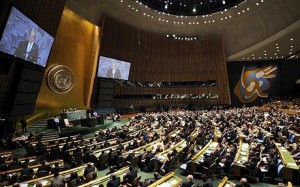UNITED NATIONS — In a political tsunami of condemnation, the General Assembly slammed Syria’s rulers for “widespread and systematic” human rights violations and demanded the Damascus regime cease the ongoing violence which has caused more than 6,000 lives during the past year of civil strife.
Given the setting and the players amongst the full 193 member Assembly, the condemnation of the Assad Family dictatorship is pretty remarkable, but rests with what as seen as increasingly helplessness to halt the conflict which has wracked Syria and increasingly threatens to destabilize the region especially Lebanon and Iraq.
The resolution, supporting Arab League efforts condemning “widespread and systematic violations of human rights and fundamental freedoms by the Syrian authorities,” such as the use of force against civilians, arbitrary executions and torture.

The vote was significant given that 137 countries, including most of the Arab and Islamic world condemned what is often referred to as a “brother Arab state.” Importantly the USA, the Europeans, India and most of East Asia equally supported the non-binding resolution.
Of the 12 states opposing the text were a dwindling band of predicable pedigree; Russia, Mainland China, Cuba, North Korea, Venezuela and Zimbabwe. Significantly the Islamic Republic of Iran, Syria’s primary regional ally, backed the Assad Alawite minority rulers. Others opposing the resolution included Belarus, Bolivia, Ecuador, Nicaragua and naturally Syria itself.
Both Moscow and Beijing recently vetoed a UN Security Council resolution which would have brought serious consequences to the Damascus rulers. Recall that historically Syria was a Soviet client state and still retains close security ties to Russia.
Significantly in reading the tea leaves among the 17 abstentions were Vietnam a country whose communist rulers were once very close to Syria, Myanmar/Burma who a year ago would have certainly voted no, Sri Lanka, whose vicious ethnic conflict mirrored Syria’s, and Lebanon, totally understandable being in Syria’s shadow and until recently occupied by Syria.
Speaking before the vote Ambassador Thomas Mayr-Harting of the European Union stated poignantly, “The regime continues its ruthless and outrageous campaign of repression against the Syrian people and the massive, gross and systematic violations of human rights.” The Ambassador lamented, that the Security Council’s recent inability to act “owing to the veto of two members, is deeply regrettable.”
UN General Assembly President Nassir Abdulaziz al-Nasser, himself from Qatar, praised the resolution which “demonstrates the world’s concern, commitment and solidarity with the Syrian people.”
Relating to the deteriorating human rights situation, Navi Pillay, the High Commissioner for Human Rights warned that the “violent government crackdown on peaceful protests demanding freedom, dignity and social justice in Syria has continued for eleven months now…tens of thousands including children have been arrested, with more than 18,000 reportedly still held in detention. Thousands more are reported missing.”
Importantly the Geneva-based Human Rights Commissioner stressed, “the nature and scale of abuses committed by the Syrian forces indicate that crimes against humanity are likely to have been committed since March 2011,” words which indicate a probability that the Damascus rulers will be brought before international criminal authorities should they surrender or be toppled.
Syria’s ethnic and religious fault lines reflect the post-colonial architecture of much of the Levant following French rule. Interestingly the Alawite Muslim minority (a Shiite group with links to Iran) has ruled over the Sunni majority. Syria’s security forces and secret police are rooted in the shadowy Alawite power structure.
Still despite longtime political repression by the Damascus rulers, the Assad family has maintained a secular state where Christians, Druze and Kurds have not faced the discrimination oft common in many Middle Eastern countries. Sadly some of the impoverished Sunnis have turned to violence and sectors of the fragmented opposition probably contain Al Qaida cadre as was the case in Libya last year.
The ongoing political conflict could in turn harden the country’s ethnic and religious fault lines, similar to neighboring Lebanon. Syria’s crisis begs resolution from the Arab League, not the USA nor NATO. Realistically neighboring Turkey’s powerful Sunni establishment will weigh into the imbroglio, France the former colonial power should focus on humanitarian actions, and the UN must press for an overdue solution to decompress and democratize the percolating situation.
As the crisis continues, Washington is wise to keep political and economic pressures on the Damascus regime, but should realistically refrain from any impulse to engage in military action or in trying to sort out Syria’s ethnic bouillabaisse which makes Iraq look simple.
John J. Metzler is a U.N. correspondent covering diplomatic and defense issues. He writes weekly for WorldTribune.com.


You must be logged in to post a comment Login